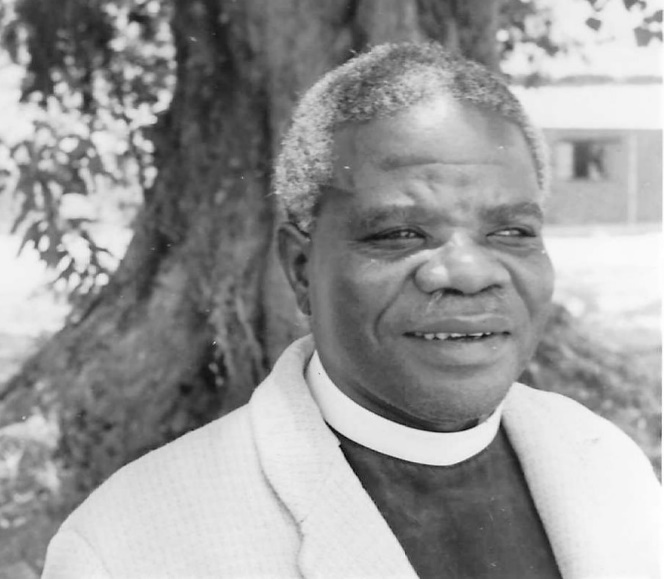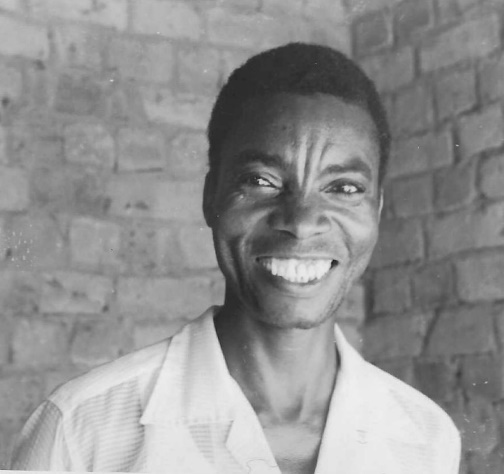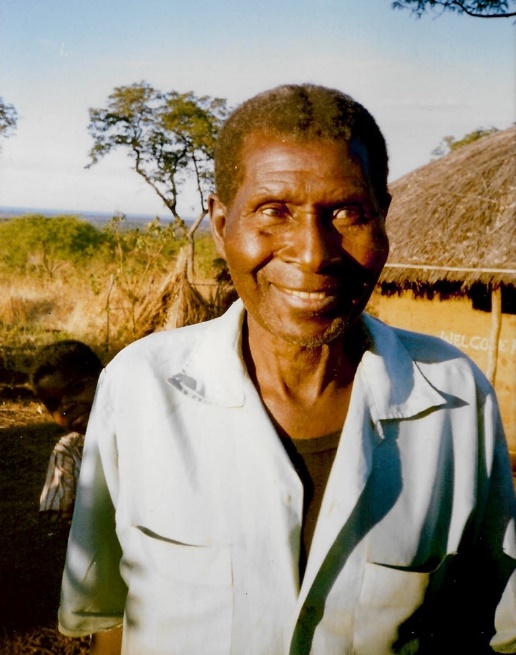Canon Oswald Chisa
Oswald Chisa was a courageous and much loved priest whom I wish I had known better. He had been imprisoned by the colonial government in 1959 and had been released before my arrival in November 1961. At the beginning of 1961 he was made Priest-in-Charge of All Saints, Nkhotakota, working with Fr Yohana Kapeta and Fr Guy Carleton.

Oswald had two careers. In 1927 he joined the medical course under Dr Wigan on Likoma Island and after qualifying in 1934 worked as a medical assistant (the core of the medical services of Malawi, as Dr Michael King describes them) at Kayoyo, Likoma and Messumba in Mozambique. After his ordination as a priest in 1949, he served in Tanganyika and Mozambique before coming to Nkhotakota in 1958. He retired in 1964 because of ill health and was made an honorary canon by Bishop Josiah Mtekateka in 1972, three years before his death in 1975. Liz Payne, who was working as a midwife and tutor at St Anne’s hospital was one of the many who packed the large church for the all night vigil preceding his funeral and wrote in Ecclesia:
During the all-night vigil the church (now the cathedral of Lake Malawi Diocese) was packed. Prayer was offered spontaneously and I myself was moved to pray. At the graveside behind the church so many people prayed, sang and wept – Christians, Muslims, those of African Traditional Religion and children – all friends of Oswald Chisa. This was a great tribute from the Nkhotakota community on 20 May 1975. One felt that the peace of the Lord was with all who had gathered.
Canon Barnaba Chipanda
Serving in a country the length of Scotland and England put together, there were twenty-one Anglican clergy belonging to the country and seven expatriates when I arrived in 1961. Of the twenty-one, twelve were in their sixties and building their retirement homes. Barnaba was one of the nine on whom the future depended. He and his wife Fedge, to whom he was devoted, both came from Malindi.
Barnaba was born in 1917, trained as a teacher at St Michael’s College and taught for sixteen years until he joined St Andrew’s Theological College on Likoma Island. He was ordained in 1960 and apprenticed to Paul Lundu at Matope, when I arrived. Soon afterwards he was put in charge of the Chilipa parish area, which later became a separate parish. Two weeks later he was sent on a two-month course for radio and script writers at Mukono in Uganda. I privately wondered how anyone so shy and retiring could become a radio star. How wrong I was! A letter came describing his first flight:
I made myself look downwards and saw something like a snake. My companion told me it was the River Shire! I was almost taking off the belt from my waist and kneeling to pray. Then I remembered what St Paul wrote, “Be ye therefore firm!” so I sat firmly and happily.
In only two months, the course turned this shy young priest into one chosen by Malawi radio for a regular slot every Sunday at 6.30. Radio Gospel Addis Ababa broadcast him to the whole of Africa every evening for three months.
Barnaba had a mind of his own. Although I had spoken of the need to revise our rules on discipline, I had no clear ideas about polygamy. It was Barnaba who first raised the issue. In a letter to Ecclesia he set out the problem of a Christian with two wives, one Christian and one of African Traditional religion. This man repaired the broken door of Chilipa church and the Christians had even bought a special chair for him, inscribed GIFT. Barnaba ends:
Thanks to this man, our church building is in good condition. Yet the children of his second wife cannot attend catechumens’ classes and he may not receive the sacraments. I pass this question to your readers: “What should we do?”
The only reply printed in Ecclesia is just signed, “Another Shepherd.” It says in brief:
- synod said last year that his wife and children could be baptised;
- polygamy is a sin, but not worse than neglect of a family;
- a man who cares for a second wife and children is better than the man who has sexual relations with anybody, not bothering about the results;
- he cannot now just abandon his second wife and her children, even though he was wrong to have taken her.
I hope that some readers will try to answer the hard question: ‘What would Christ do?’
Barnaba was one of the first of the Malawi clergy to show enthusiasm for growing involvement with Blantyre Presbyterian synod. He writes about a joint conference of ministers and clergy:
This was the first time that shepherds of both churches were able to meet and discuss their problems and to worship together. We talked as friends and discussed our differences and problems. The climax was the last day when both groups knelt in front of God to adore him.
In October 1970, Barnaba was appointed Archdeacon of Shire and priest-in-charge of Mponda’s. In the following year he was invited to join a radio workshop sponsored by the Catholic Church in East Africa. In the first week seventy radio programmes were recorded, and in the second week articles were written for publication in Malawian newspapers and magazines. Other participants included Fr Dunstan Ainani, who later became Bishop of South Malawi, and Fr George Ndomondo, the former MP for Fort Johnston West, who was ordained after his release from detention following the Henry Chipembere rebellion. Barnaba later became Vicar-General, and worked at Nkope, Balaka and Monkey Bay until his retirement in 1987.
Fr George Ndomondo, his former MP, writes:
He was fond of taking snuff but remained a smart priest. Snuff made him a lot of Moslem friends, who loved and respected him. While he was in retirement at Mponda’s he continued to witness, not only in church but also when taking funerals. He knew what the cross had done for him and therefore what it will do for everyone else. He always had a message when he stood to preach, not a single person could go to sleep. In his long sermons each point was explained with emphasis, sometimes by hitting any object near, sometimes by hitting his chest. He was a man of prayer. Though he was short, his powerful voice made him a powerful preacher. Mponda’s experienced a good catch from the net Fr Chipanda used to fish people along the shore of our waters of Galilee, the Shire River.
Canon Chipanda’s sudden death on 2 October 2002 was a great shock. A vast crowd showed the respect and affection with which this godly man was held by Christians and Moslems alike. Christians miss his lovely chanting. May he and his Fedge rest in peace!
Fr Jerome Bai
At Liwaladzi, 20 miles north of Nkhotakota, the priest, Jerome Bai had formerly been a medical assistant and his wife a nurse and they were performing prodigious service to the community by treating some 10,000 patients a year, using their own home as a clinic.

The people in response were anxious to build a new home for them, but the Diocese had no funds to provide more than a new roof. Nothing daunted, the congregation went ahead and built a home considerably larger than the standard plan at less than half the standard cost. The rest came from parish funds and free labour. Clearly there was energy in the local church waiting to be recognised.
Fr Lloyd Chikoko
Self-propagation was another mark of a truly indigenous church. Here a fine example was being set by Lloyd Chikoko. Lloyd came from Chongole, south of the Chia Lagoon in central Malawi. Most of his working life had been spent in industry in Rhodesia and South Africa, where he was ordained in the African Orthodox Church. Since returning to Nyasaland two years earlier, he found himself a widower and became a voluntary helper to Father John Mwassi.
The team interviewing new students for St John’s Seminary in Lusaka gave him a good report, which I happily accepted. At the end of his first term there was a shock. A letter came from the Principal, John Weller, “We all love Lloyd, but think you should consider his report before sending him back for another term.” Attached was his exam report showing 12% for New Testament, 7% for Old Testament … I said a few prayers, consulted others and sent back a telegram, “Lloyd returning.”
He went back and was ordained priest on 21 December 1965 with others who became excellent pastors – George Mchakama, Peter Sauli and John Masano. Taking part in the ordination was Canon Petro Kilekwa, then 96, the slave-boy who became a priest and the first Malawian to be posted to an area away from the Lakeshore. There is more on Petro Kilekwa here.
Lloyd was unequalled as an evangelist. Long walks did not deter him. The Anglican students at Don Bosco Teacher Training College were so impressed that he had walked seventy miles to celebrate the Eucharist for them , they wrote to Ecclesia saying that not only they but the two Catholic priests on their staff wanted to pay tribute to him.
All this has been achieved because of regular evangelism undertaken by Fr Chikoko and his voluntary helpers. If all Church Elders and other faithful Christians also regarded themselves as ambassadors of Christ, we would certainly bring to him many who do not know him. Your prayers, and regular visits by our bishops – that is what we need.”
A layman, Mr J.W.Chiteje, from Lloyd’s parish at Dwambazi wrote:
“The small and scattered flock of Anglicans from Chizumulu Island and Mozambique was looked after by priests from Nkhotakota, but until Fr Chikoko there were few church buildings and converts. This year alone Dwambazi has shown big developments. Two new churches have been built, one at Ngala and another at Liuzi. Liuzi has built a catechist’s house and a small rest-house for the present. Eighty-nine adults were baptized on St Bartholomew’s day. There were also one hundred and six people who received the cross (as Hearers, beginning their baptism preparation) and a large number of children have been baptized.
In January 1970 Bishop Josiah Mtekateka wrote:
I went to confirm the first fruits of Fr Lloyd Chikoko’s work in the mountains near the Vipya Plateau. To reach the place we had to pass through Iwawa Forest. We left the car at the nearest camp – before we arrived we saw much game. From there we walked for four hours, but on our way back the next morning we walked only two hours.
Fr Chikoko told me that when he first started going through those mountains he met the Group Headman called Chikumi, who said, “You cannot baptise any person in my area, first of all baptise me.” Fr Chikoko answered, “We do not baptise any person until he/she has received all instructions, we need to know that he understands. I shall baptise you later on after you have been taught everything we wish you to know and understand.” Then Fr Chikoko was allowed to go around some of his villages. When he came to Muwawa Village, he first met a young maiden, Wainesi by name, and after talking to her she said, “Let me go and find others for you, not only myself alone.” So she went and brought six with her, three men and three women and they joined the class.
This, my first time there, I confirmed 45 candidates including the Group Headman himself. Here there is a very hard work for the catechist as well as Fr Chikoko, going through those mountains and he goes to each of the villages, but he cannot go home the same day when he visits his villages every week. He is doing this because it is very hard for him to return on the third day because of the long way, hills and mountains and for the benefit of the congregations. The catechist’s name is Mr Samuel Chimulu and he has six places to look after.
Fr Chikoko has thirty-four villages to go round and he has six catechists, many of them scattered in the hills and mountains. In October Fr Chikoko was ill for a month and received many injections. The Roman Catholic Father from Nkhata Bay, who knows him well, said, “Fr Chikoko must be ill because he walks so much. I am afraid that if he will be taken from here, our work will die.”
I wish you to remember Fr Chikoko in your prayers, together with his catechists and the people in this remote area.

In 1972 Lloyd was transferred to Chiruwa parish, between Salima and Chia. The same story was repeated. Mr Amoni wrote an article for Ecclesia headed “Chiruwa Parish is Outward Looking;”
“Between Chiruwa and Salima is a small island called Mbeje. Many people go there to catch and buy fish for sale. No priest has made an effort to visit these people. Since the arrival of Fr Lloyd Chikoko in the parish, however, he has been visiting this island to celebrate Holy Communion.
He also visits people on the main land who are not Christians. While he is making these visits, Christians from Mtosa, the head station, and from other congregations, take it in turns to conduct services. Other priests should think of doing this. Bishop Josiah Mtekateka also spent several days with us. This was really encouraging.
I sometimes reflect on the fruits of Lloyd’s ministry when I receive appeals from ordinands for sums of money equal to Lloyd’s salary for six months to purchase massive tomes by Karl Barth to enable them to take a degree. Lloyd was made a canon by Bishop Josiah in 1974 and retired in 1979.
I last saw him at his home in the hills behind Chongole when visiting Malawi in 1992. He was totally blind, but was still celebrating the Eucharist from memory and planning the building of a new church in the little hilltop village where he lived. Lloyd died in 1997 the finest evangelist I have ever known.”
